Unit 2 How do you come to school? 单元测试(含答案)
文档属性
| 名称 | Unit 2 How do you come to school? 单元测试(含答案) |
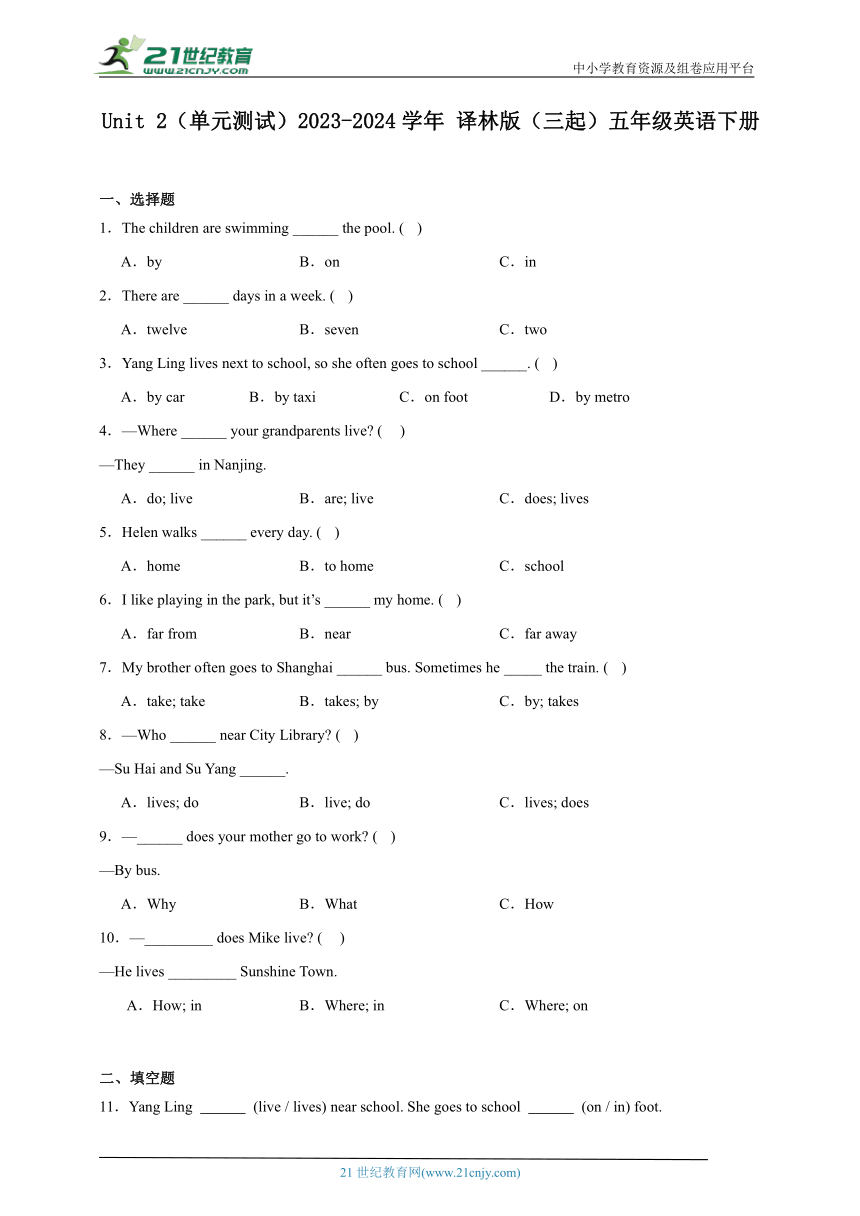
|
|
| 格式 | docx | ||
| 文件大小 | 579.2KB | ||
| 资源类型 | 试卷 | ||
| 版本资源 | 牛津译林版 | ||
| 科目 | 英语 | ||
| 更新时间 | 2024-03-05 00:00:00 | ||
图片预览

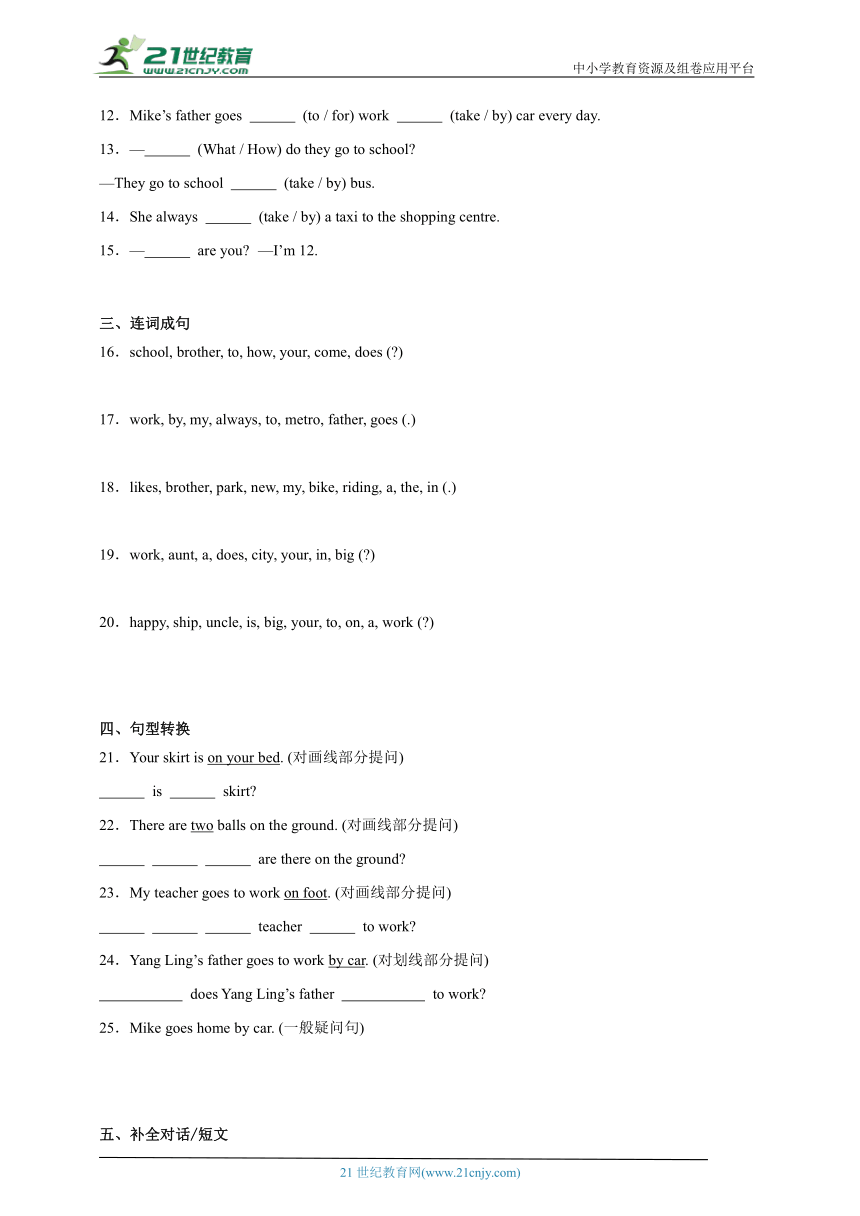
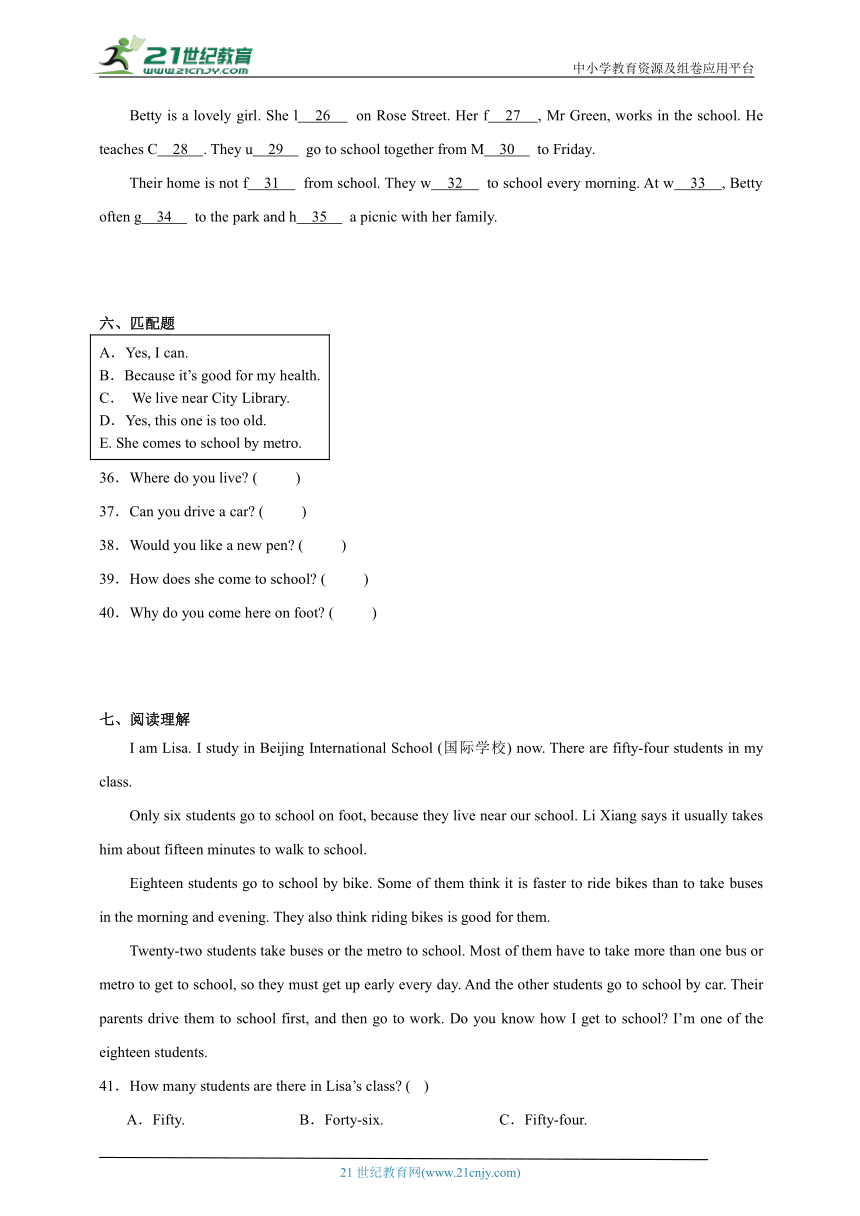
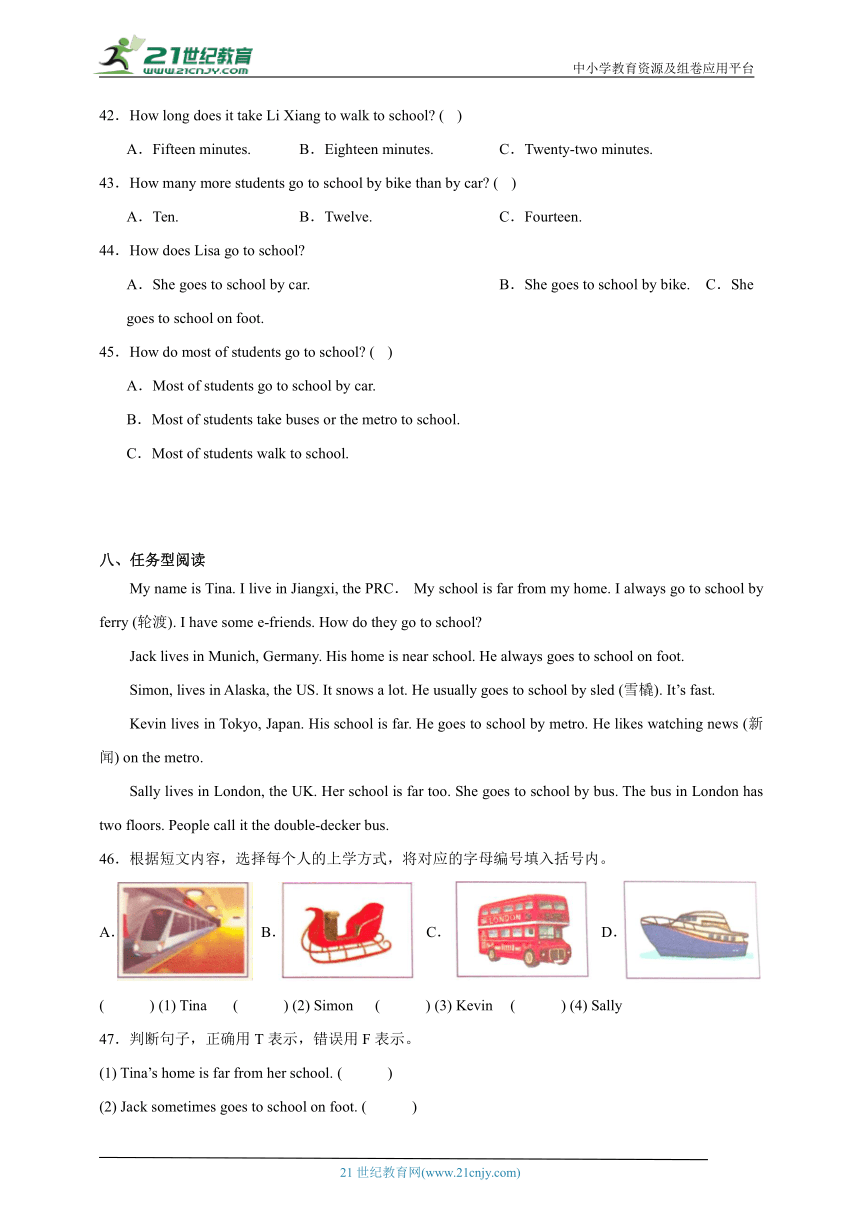
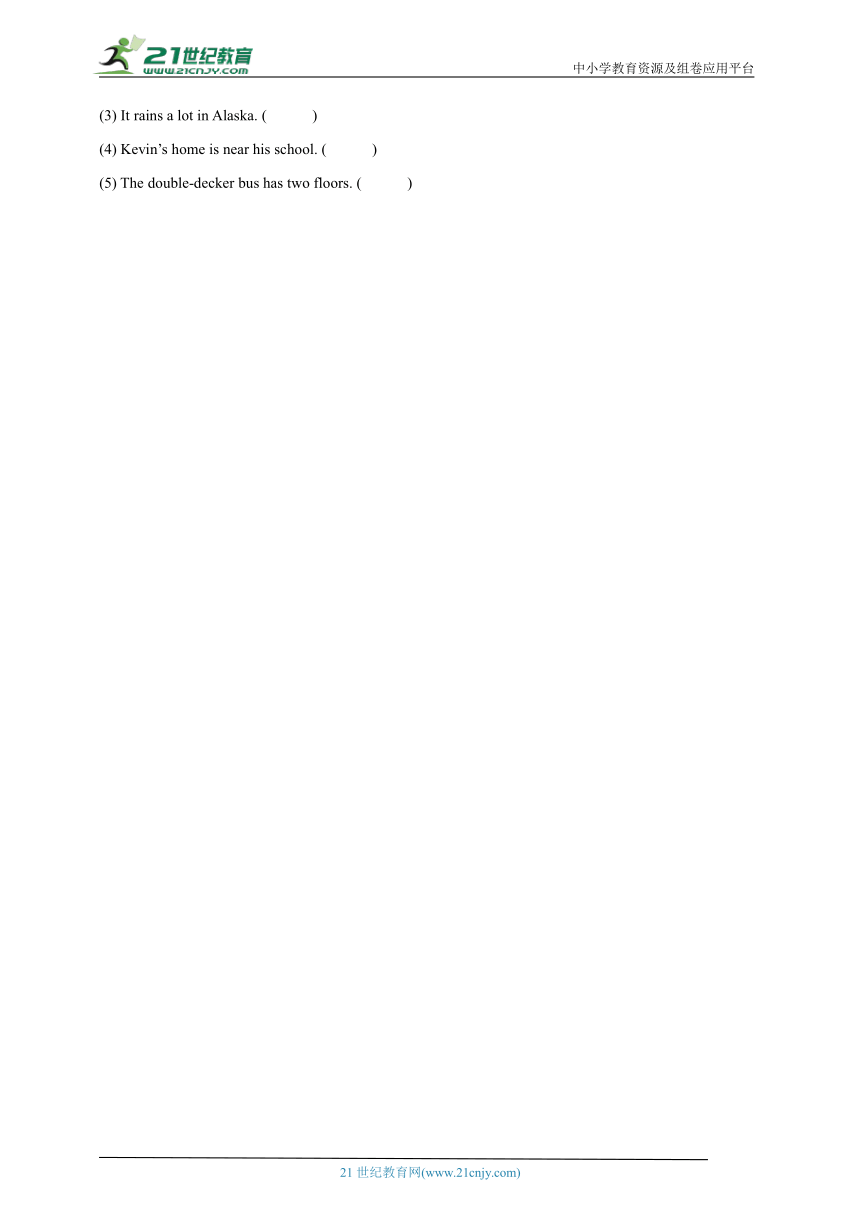
文档简介
中小学教育资源及组卷应用平台
Unit 2(单元测试)2023-2024学年 译林版(三起)五年级英语下册
一、选择题
1.The children are swimming ______ the pool. ( )
A.by B.on C.in
2.There are ______ days in a week. ( )
A.twelve B.seven C.two
3.Yang Ling lives next to school, so she often goes to school ______. ( )
A.by car B.by taxi C.on foot D.by metro
4.—Where ______ your grandparents live ( )
—They ______ in Nanjing.
A.do; live B.are; live C.does; lives
5.Helen walks ______ every day. ( )
A.home B.to home C.school
6.I like playing in the park, but it’s ______ my home. ( )
A.far from B.near C.far away
7.My brother often goes to Shanghai ______ bus. Sometimes he _____ the train. ( )
A.take; take B.takes; by C.by; takes
8.—Who ______ near City Library ( )
—Su Hai and Su Yang ______.
A.lives; do B.live; do C.lives; does
9.—______ does your mother go to work ( )
—By bus.
A.Why B.What C.How
10.—_________ does Mike live ( )
—He lives _________ Sunshine Town.
A.How; in B.Where; in C.Where; on
二、填空题
11.Yang Ling (live / lives) near school. She goes to school (on / in) foot.
12.Mike’s father goes (to / for) work (take / by) car every day.
13.— (What / How) do they go to school
—They go to school (take / by) bus.
14.She always (take / by) a taxi to the shopping centre.
15.— are you —I’m 12.
三、连词成句
16.school, brother, to, how, your, come, does ( )
17.work, by, my, always, to, metro, father, goes (.)
18.likes, brother, park, new, my, bike, riding, a, the, in (.)
19.work, aunt, a, does, city, your, in, big ( )
20.happy, ship, uncle, is, big, your, to, on, a, work ( )
四、句型转换
21.Your skirt is on your bed. (对画线部分提问)
is skirt
22.There are two balls on the ground. (对画线部分提问)
are there on the ground
23.My teacher goes to work on foot. (对画线部分提问)
teacher to work
24.Yang Ling’s father goes to work by car. (对划线部分提问)
does Yang Ling’s father to work
25.Mike goes home by car. (一般疑问句)
五、补全对话/短文
Betty is a lovely girl. She l 26 on Rose Street. Her f 27 , Mr Green, works in the school. He teaches C 28 . They u 29 go to school together from M 30 to Friday.
Their home is not f 31 from school. They w 32 to school every morning. At w 33 , Betty often g 34 to the park and h 35 a picnic with her family.
六、匹配题
A.Yes, I can. B.Because it’s good for my health. C. We live near City Library. D.Yes, this one is too old. E. She comes to school by metro.
36.Where do you live ( )
37.Can you drive a car ( )
38.Would you like a new pen ( )
39.How does she come to school ( )
40.Why do you come here on foot ( )
七、阅读理解
I am Lisa. I study in Beijing International School (国际学校) now. There are fifty-four students in my class.
Only six students go to school on foot, because they live near our school. Li Xiang says it usually takes him about fifteen minutes to walk to school.
Eighteen students go to school by bike. Some of them think it is faster to ride bikes than to take buses in the morning and evening. They also think riding bikes is good for them.
Twenty-two students take buses or the metro to school. Most of them have to take more than one bus or metro to get to school, so they must get up early every day. And the other students go to school by car. Their parents drive them to school first, and then go to work. Do you know how I get to school I’m one of the eighteen students.
41.How many students are there in Lisa’s class ( )
A.Fifty. B.Forty-six. C.Fifty-four.
42.How long does it take Li Xiang to walk to school ( )
A.Fifteen minutes. B.Eighteen minutes. C.Twenty-two minutes.
43.How many more students go to school by bike than by car ( )
A.Ten. B.Twelve. C.Fourteen.
44.How does Lisa go to school
A.She goes to school by car. B.She goes to school by bike. C.She goes to school on foot.
45.How do most of students go to school ( )
A.Most of students go to school by car.
B.Most of students take buses or the metro to school.
C.Most of students walk to school.
八、任务型阅读
My name is Tina. I live in Jiangxi, the PRC. My school is far from my home. I always go to school by ferry (轮渡). I have some e-friends. How do they go to school
Jack lives in Munich, Germany. His home is near school. He always goes to school on foot.
Simon, lives in Alaska, the US. It snows a lot. He usually goes to school by sled (雪橇). It’s fast.
Kevin lives in Tokyo, Japan. His school is far. He goes to school by metro. He likes watching news (新闻) on the metro.
Sally lives in London, the UK. Her school is far too. She goes to school by bus. The bus in London has two floors. People call it the double-decker bus.
46.根据短文内容,选择每个人的上学方式,将对应的字母编号填入括号内。
A. B. C. D.
( ) (1) Tina ( ) (2) Simon ( ) (3) Kevin ( ) (4) Sally
47.判断句子,正确用T表示,错误用F表示。
(1) Tina’s home is far from her school. ( )
(2) Jack sometimes goes to school on foot. ( )
(3) It rains a lot in Alaska. ( )
(4) Kevin’s home is near his school. ( )
(5) The double-decker bus has two floors. ( )
参考答案:
1.C
【详解】句意:孩子们正在池子______游泳。本题考查介词辨析。A通过某种方式,B在……上,C在……里。根据生活常识,人们在池子里游泳,故选C。
2.B
【详解】句意:一周有七天。本题考查基数词。A12,B7,C2,根据常识,故选B。
3.C
【详解】句意:杨玲住在学校旁边,因此她经常步行上学。本题考查介词固定搭配,A乘汽车,B乘出租车,C步行,D乘地铁,根据句意和所给选项可知是介词短语on foot,表示步行。故选C。
4.A
【详解】句意:—你的祖父母(外祖父)住在哪里?—他们住在南京。本题考查助动词和动词的形式。live是实义动词原形,are后不跟动词原形,主语your grandparents是复数,助动词是do;第二句主语是they,谓语动词live是原形。故选A。
5.A
【详解】句意:海伦每天步行回家。本题考查动词短语。walk to步行去,home是副词,前面省略to;walk to school步行去学校。故选A。
6.A
【详解】句意:我喜欢在公园里玩,但是它离我家很远。本题考查固定搭配。A远离,B离……近;C遥远的,根据句意可知A选项符合。故选A。
7.C
【详解】句意:我弟弟(哥哥)通常______公共汽车去上海。有时他______火车去。本题考查介词的固定搭配和动词短语和动词的形式,by bus乘公共汽车,坐火车take the train,he做主语时,谓语动词用第三人称单数takes。故选C。
8.A
【详解】句意:—谁住在市图书馆附近?—苏海和苏扬。本题考查动词的形式和助动词。本题时态是一般现在时态,问句主语是who,谓语动词live用第三人称单数lives,答语主语是复数,助动词do用原形。故选A。
9.C
【详解】句意:—你的妈妈_________去上班?—坐公交车。本题考查疑问词,A为什么,B什么,C怎样。根据答句回答交通方式,可知用疑问词How,故选C。
10.B
【详解】句意:—迈克居住在哪里?—他居住在阳光镇。本题考查疑问副词和介词辨析。How怎样,Where在哪里,根据答语可知问句为:迈克居住在哪里?故排除选项A。在哪个城市要用介词in,on表示在……上面,Sunshine Town是个城镇,故选B。
11. lives on
【详解】句意:杨玲住在学校附近。她步行上学。本题考查动词的形式和介词的固定搭配,Yang Ling是第三人称单数,谓语动词用第三人称单数形式,live的第三人称单数是lives;on foot步行,固定搭配,故答案为lives;on。
12. to
by
【详解】句意:迈克的爸爸每天坐汽车去上班。本题考查动词短语和介词的固定搭配,动词短语go to work去上班;by+交通工具,固定搭配,by car坐汽车,故答案为to;by。
13. How by
【详解】句意:—他们_______去上学?—他们______公交去上学。本题考查疑问词和方式介词。由答语可知要提问去学校的交通方式,how“怎样”符合语境;答语主谓结构完整,介词短语作状语,by bus坐公交,by符合语境。故答案为How;by。
14.takes
【详解】句意:她总是打的去购物中心。本题考查动词的形式。take搭乘,动词;by通过某种方式,介词。该句缺少谓语,由always可知该句是一般现在时,主语是she,谓语动词用第三人称单数,take的第三人称单数是takes,故答案为takes。
15.How old
【详解】句意:—你_________?—我12岁。本题考查其他固定搭配。由答语可知要提问年龄,用how old“几岁”提问,故答案为How old。
16.How does your brother come to school
【详解】本题考查句子结构。come to school来上学,brother哥哥(弟弟),how怎样,your你的,does助动词,根据所给的问号,可知句子是一个疑问句,根据所给词义可以连成句子:你哥哥(弟弟)是怎么来学校的?故答案为How does your brother come to school
17.My father always goes to work by metro.
【详解】goes to work去上班,by metro乘地铁,my我的,always总是,father爸爸,根据所给句号和单词,可知句子是陈述句,根据词义连成句子:我爸爸总是乘地铁去上班。故答案为My father always goes to work by metro.
18.My brother likes riding a new bike in the park.
【详解】likes喜欢,brother哥哥(弟弟), in the park在公园里,new新的,my我的,bike自行车,riding骑,a一,根据所给的句号,可知句子是一个陈述句,根据所给词义可以连成句子:我哥哥(弟弟)喜欢在公园里骑新自行车。故答案为My brother likes riding a new bike in the park.
19.Does your aunt work in a big city
【详解】work工作,aunt阿姨,a一个,does助动词,city城市,in在……里,big大的,根据所给问号,可知句子是疑问句,根据所给词词义可以连成句子:你的阿姨在一个大城市工作吗?故答案为Does your aunt work in a big city
20.Is your uncle happy to work on a big ship
【详解】happy高兴的,ship轮船,your uncle你的叔叔,to work去上班,is是,big大的,on在上面,根据所给标点符号可知是个一般疑问句,根据所给词可以连成句子:你叔叔乐意在一艘大船上工作吗?故答案为Is your uncle happy to work on a big ship
21. Where my
【详解】原句句意:你的裙子在你的床上。本题考查句型转换。由画线部分可知要提问地点位置,由where“在哪里”提问,your改为my,故答案为Where;my。
22. How many balls
【详解】原句句意:有两个球在地上。本题考查句型转换。由画线部分可知要提问数量,用how many“多少”提问,how many后接可数名词复数,ball变为复数balls。故答案为How;many;balls。
23. How does your go
【详解】原句句意:我的老师步行去上班。由画线部分可知要提问交通方式,用how“怎样”提问。该句是一般现在时,主语是teacher,助动词用does;my改成your;does后接动词原形,goes变为go。故答案为How;does;your;go。
24. How go
【详解】原句句意:杨玲的爸爸坐汽车去上班。本题考查句型转换。划线部分是交通工具,用how提问,助动词does后的动词用原形,goes的原形是go,故答案为How,go。
25.Does Mike go home by car
【详解】原句句意:迈克坐汽车回家。本题考查句型转换。原句主语Mike是第三人称单数,句子是一般现在时,改为一般疑问句,助动词用does,goes变原形go,故答案为Does Mike go home by car
26.lives/ives 27.father/ather 28.Chinese/hinese 29.usually/sually 30.Monday/onday 31.far/ar 32.walk/alk 33.weekends/eekends 34.goes/oes 35.has/as
【导语】本文介绍了贝蒂和她的爸爸从星期一到星期五一起步行上学,周末她经常和家人去公园野餐。
26.句意:她住在玫瑰街。根据句意和首字母,可知考查短语live on住在,句子是一般现在时,主语She是第三人称单数,谓语动词用动词第三人称单数,live第三人称单数为lives,故答案为lives。
27.句意:她的___,格林先生,在一所学校工作。根据句意和首字母,可知考查单词father爸爸,名词,故答案为father。
28.句意:他教____。根据句意和首字母,可知考查单词Chinese语文,专有名词,故答案为Chinese。
29.句意:他们____从星期一到星期五一起去上学。根据句意和首字母,可知考查单词usually通常,频度副词,故答案为usually。
30.句意:他们通常从____到星期五一起去上学。根据句意和首字母,可知考查单词Monday星期一,专有名词,故答案为Monday。
31.句意:他们家离学校不远。根据句意和首字母,可知考查短语far from离……远,介词短语,故答案为far。
32.句意:他们每天早上____去上学。根据句意和首字母,可知考查短语walk to school步行去上学,句子是一般现在时,主语They是第三人称复数,谓语动词用动词原形,故答案为walk。
33.句意:在____,贝蒂经常和她的家人去公园野餐。根据句意和首字母,可知考查短语at weekends在周末,介词短语,故答案为weekends。
34.句意:在周末,贝蒂经常和她的家人去公园野餐。根据句意和首字母,可知考查单词go去,句子是一般现在时,主语Betty是第三人称单数,谓语动词用动词第三人称单数,go第三人称单数为goes,故答案为goes。
35.句意:在周末,贝蒂经常和她的家人去公园野餐。根据句意和首字母,可知考查短语have a picnic去野餐,goes是第三人称单数,and连接的动词形式必须一致,have第三人称单数为has,故答案为has。
36.C 37.A 38.D 39.E 40.B
【解析】36.句意:你们住在哪里?答语说地点,C选项我们住在城市图书馆附近。符合题意,故选C。
37.句意:你会开小汽车吗?答语用yes或no回答,A选项是的,我会。符合题意,故选A。
38.句意:你想要一支新钢笔吗?答语用yes或no回答,D选项是的,这个太旧了。符合题意,故选D。
39.句意:她怎么来上学?答语说方式,E选项她乘地铁来上学。符合题意,故选E。
40.句意:你为什么步行来这儿?答语说原因,B选项因为它对我的健康有好处。符合题意,故选B。
41.C 42.A 43.A 44.B 45.B
【导语】本文主要介绍了在北京国际学校读书的丽萨的同学分别是怎样去上学的。
41.句意:丽莎的班上有多少学生 A50 B46 C54 根据文中“There are fifty-four students in my class.”可知丽莎的班上有54个学生。故选C。
42.句意:李湘步行去学校要花多长时间 A15分钟;B18分钟;C22分钟;根据文中“Li Xiang says it usually takes him about fifteen minutes to walk to school.”可知李湘步行去学校要花15分钟。故选A。
43.句意:骑自行车上学的学生比开车上学的学生多多少 根据文中“Only six students go to school on foot, Eighteen students go to school by bike. Twenty-two students take buses or the metro to school.And the other students go to school by car. ”可知6个学生步行。18个学生骑自行车。22个学生乘公交车或乘地铁。班上一共有54个学生,54-6-18-22=8 所以乘小汽车去上学的有8人。18-8=10,骑自行车上学的学生比开车上学的学生多10人。故选A。
44.句意:丽莎怎么去上学 A乘汽车去学校;B骑自行车去上学;C步行去上学;根据文中“ I’m one of the eighteen students.和Eighteen students go to school by bike. ” 可知丽莎是骑自行车去上学。故选B。
45.句意:大多数学生怎样去上学 A大多数学生开车上学。B大多数学生乘公共汽车或地铁上学。 C大多数学生步行上学。根据小题3的分析,6个学生步行。18个学生骑自行车。22个学生乘公交车或乘地铁。8个学生乘小汽车。可知大多数学生乘公交车或地铁去上学。故选B。
46. D B A C 47. T F F F T
【导语】本文介绍了几个人上学的交通方式。
46.(1)根据“I always go to school by ferry (轮渡).”,可知蒂娜总是乘轮渡上学,故选D。
(2)根据“Simon, lives in Alaska, the US. It snows a lot. He usually goes to school by sled (雪橇).”,可知西蒙总是乘雪橇上学,故选B。
(3)根据“Kevin lives in Tokyo, Japan. His school is far. He goes to school by metro.”,可知凯文乘地铁上学,故选A。
(4)根据“Sally lives in London, the UK. Her school is far too. She goes to school by bus.”,可知萨利乘公共汽车上学,故选C。
47.(1)句意: 蒂娜的家离她的学校很远。根据“My school is far from my home.”,可知题干描述正确,故答案为T。
(2)句意: 杰克有时步行上学。根据“Jack lives in Munich, Germany. His home is near school. He always goes to school on foot.”,可知杰克总是步行上学,故答案为F。
(3)句意:阿拉斯加经常下雨。根据“Simon, lives in Alaska, the US. It snows a lot.”,可知阿拉斯加经常下雪,故答案为F。
(4)句意:凯文的家在他的学校附近。根据“Kevin lives in Tokyo, Japan. His school is far. He goes to school by metro.”,可知凯文的家离学校很远,故答案为F。
(5)句意:双层巴士有两层。根据“The bus in London has two floors.”,可知题干描述正确,故答案为T。
21世纪教育网 www.21cnjy.com 精品试卷·第 2 页 (共 2 页)
21世纪教育网(www.21cnjy.com)
Unit 2(单元测试)2023-2024学年 译林版(三起)五年级英语下册
一、选择题
1.The children are swimming ______ the pool. ( )
A.by B.on C.in
2.There are ______ days in a week. ( )
A.twelve B.seven C.two
3.Yang Ling lives next to school, so she often goes to school ______. ( )
A.by car B.by taxi C.on foot D.by metro
4.—Where ______ your grandparents live ( )
—They ______ in Nanjing.
A.do; live B.are; live C.does; lives
5.Helen walks ______ every day. ( )
A.home B.to home C.school
6.I like playing in the park, but it’s ______ my home. ( )
A.far from B.near C.far away
7.My brother often goes to Shanghai ______ bus. Sometimes he _____ the train. ( )
A.take; take B.takes; by C.by; takes
8.—Who ______ near City Library ( )
—Su Hai and Su Yang ______.
A.lives; do B.live; do C.lives; does
9.—______ does your mother go to work ( )
—By bus.
A.Why B.What C.How
10.—_________ does Mike live ( )
—He lives _________ Sunshine Town.
A.How; in B.Where; in C.Where; on
二、填空题
11.Yang Ling (live / lives) near school. She goes to school (on / in) foot.
12.Mike’s father goes (to / for) work (take / by) car every day.
13.— (What / How) do they go to school
—They go to school (take / by) bus.
14.She always (take / by) a taxi to the shopping centre.
15.— are you —I’m 12.
三、连词成句
16.school, brother, to, how, your, come, does ( )
17.work, by, my, always, to, metro, father, goes (.)
18.likes, brother, park, new, my, bike, riding, a, the, in (.)
19.work, aunt, a, does, city, your, in, big ( )
20.happy, ship, uncle, is, big, your, to, on, a, work ( )
四、句型转换
21.Your skirt is on your bed. (对画线部分提问)
is skirt
22.There are two balls on the ground. (对画线部分提问)
are there on the ground
23.My teacher goes to work on foot. (对画线部分提问)
teacher to work
24.Yang Ling’s father goes to work by car. (对划线部分提问)
does Yang Ling’s father to work
25.Mike goes home by car. (一般疑问句)
五、补全对话/短文
Betty is a lovely girl. She l 26 on Rose Street. Her f 27 , Mr Green, works in the school. He teaches C 28 . They u 29 go to school together from M 30 to Friday.
Their home is not f 31 from school. They w 32 to school every morning. At w 33 , Betty often g 34 to the park and h 35 a picnic with her family.
六、匹配题
A.Yes, I can. B.Because it’s good for my health. C. We live near City Library. D.Yes, this one is too old. E. She comes to school by metro.
36.Where do you live ( )
37.Can you drive a car ( )
38.Would you like a new pen ( )
39.How does she come to school ( )
40.Why do you come here on foot ( )
七、阅读理解
I am Lisa. I study in Beijing International School (国际学校) now. There are fifty-four students in my class.
Only six students go to school on foot, because they live near our school. Li Xiang says it usually takes him about fifteen minutes to walk to school.
Eighteen students go to school by bike. Some of them think it is faster to ride bikes than to take buses in the morning and evening. They also think riding bikes is good for them.
Twenty-two students take buses or the metro to school. Most of them have to take more than one bus or metro to get to school, so they must get up early every day. And the other students go to school by car. Their parents drive them to school first, and then go to work. Do you know how I get to school I’m one of the eighteen students.
41.How many students are there in Lisa’s class ( )
A.Fifty. B.Forty-six. C.Fifty-four.
42.How long does it take Li Xiang to walk to school ( )
A.Fifteen minutes. B.Eighteen minutes. C.Twenty-two minutes.
43.How many more students go to school by bike than by car ( )
A.Ten. B.Twelve. C.Fourteen.
44.How does Lisa go to school
A.She goes to school by car. B.She goes to school by bike. C.She goes to school on foot.
45.How do most of students go to school ( )
A.Most of students go to school by car.
B.Most of students take buses or the metro to school.
C.Most of students walk to school.
八、任务型阅读
My name is Tina. I live in Jiangxi, the PRC. My school is far from my home. I always go to school by ferry (轮渡). I have some e-friends. How do they go to school
Jack lives in Munich, Germany. His home is near school. He always goes to school on foot.
Simon, lives in Alaska, the US. It snows a lot. He usually goes to school by sled (雪橇). It’s fast.
Kevin lives in Tokyo, Japan. His school is far. He goes to school by metro. He likes watching news (新闻) on the metro.
Sally lives in London, the UK. Her school is far too. She goes to school by bus. The bus in London has two floors. People call it the double-decker bus.
46.根据短文内容,选择每个人的上学方式,将对应的字母编号填入括号内。
A. B. C. D.
( ) (1) Tina ( ) (2) Simon ( ) (3) Kevin ( ) (4) Sally
47.判断句子,正确用T表示,错误用F表示。
(1) Tina’s home is far from her school. ( )
(2) Jack sometimes goes to school on foot. ( )
(3) It rains a lot in Alaska. ( )
(4) Kevin’s home is near his school. ( )
(5) The double-decker bus has two floors. ( )
参考答案:
1.C
【详解】句意:孩子们正在池子______游泳。本题考查介词辨析。A通过某种方式,B在……上,C在……里。根据生活常识,人们在池子里游泳,故选C。
2.B
【详解】句意:一周有七天。本题考查基数词。A12,B7,C2,根据常识,故选B。
3.C
【详解】句意:杨玲住在学校旁边,因此她经常步行上学。本题考查介词固定搭配,A乘汽车,B乘出租车,C步行,D乘地铁,根据句意和所给选项可知是介词短语on foot,表示步行。故选C。
4.A
【详解】句意:—你的祖父母(外祖父)住在哪里?—他们住在南京。本题考查助动词和动词的形式。live是实义动词原形,are后不跟动词原形,主语your grandparents是复数,助动词是do;第二句主语是they,谓语动词live是原形。故选A。
5.A
【详解】句意:海伦每天步行回家。本题考查动词短语。walk to步行去,home是副词,前面省略to;walk to school步行去学校。故选A。
6.A
【详解】句意:我喜欢在公园里玩,但是它离我家很远。本题考查固定搭配。A远离,B离……近;C遥远的,根据句意可知A选项符合。故选A。
7.C
【详解】句意:我弟弟(哥哥)通常______公共汽车去上海。有时他______火车去。本题考查介词的固定搭配和动词短语和动词的形式,by bus乘公共汽车,坐火车take the train,he做主语时,谓语动词用第三人称单数takes。故选C。
8.A
【详解】句意:—谁住在市图书馆附近?—苏海和苏扬。本题考查动词的形式和助动词。本题时态是一般现在时态,问句主语是who,谓语动词live用第三人称单数lives,答语主语是复数,助动词do用原形。故选A。
9.C
【详解】句意:—你的妈妈_________去上班?—坐公交车。本题考查疑问词,A为什么,B什么,C怎样。根据答句回答交通方式,可知用疑问词How,故选C。
10.B
【详解】句意:—迈克居住在哪里?—他居住在阳光镇。本题考查疑问副词和介词辨析。How怎样,Where在哪里,根据答语可知问句为:迈克居住在哪里?故排除选项A。在哪个城市要用介词in,on表示在……上面,Sunshine Town是个城镇,故选B。
11. lives on
【详解】句意:杨玲住在学校附近。她步行上学。本题考查动词的形式和介词的固定搭配,Yang Ling是第三人称单数,谓语动词用第三人称单数形式,live的第三人称单数是lives;on foot步行,固定搭配,故答案为lives;on。
12. to
by
【详解】句意:迈克的爸爸每天坐汽车去上班。本题考查动词短语和介词的固定搭配,动词短语go to work去上班;by+交通工具,固定搭配,by car坐汽车,故答案为to;by。
13. How by
【详解】句意:—他们_______去上学?—他们______公交去上学。本题考查疑问词和方式介词。由答语可知要提问去学校的交通方式,how“怎样”符合语境;答语主谓结构完整,介词短语作状语,by bus坐公交,by符合语境。故答案为How;by。
14.takes
【详解】句意:她总是打的去购物中心。本题考查动词的形式。take搭乘,动词;by通过某种方式,介词。该句缺少谓语,由always可知该句是一般现在时,主语是she,谓语动词用第三人称单数,take的第三人称单数是takes,故答案为takes。
15.How old
【详解】句意:—你_________?—我12岁。本题考查其他固定搭配。由答语可知要提问年龄,用how old“几岁”提问,故答案为How old。
16.How does your brother come to school
【详解】本题考查句子结构。come to school来上学,brother哥哥(弟弟),how怎样,your你的,does助动词,根据所给的问号,可知句子是一个疑问句,根据所给词义可以连成句子:你哥哥(弟弟)是怎么来学校的?故答案为How does your brother come to school
17.My father always goes to work by metro.
【详解】goes to work去上班,by metro乘地铁,my我的,always总是,father爸爸,根据所给句号和单词,可知句子是陈述句,根据词义连成句子:我爸爸总是乘地铁去上班。故答案为My father always goes to work by metro.
18.My brother likes riding a new bike in the park.
【详解】likes喜欢,brother哥哥(弟弟), in the park在公园里,new新的,my我的,bike自行车,riding骑,a一,根据所给的句号,可知句子是一个陈述句,根据所给词义可以连成句子:我哥哥(弟弟)喜欢在公园里骑新自行车。故答案为My brother likes riding a new bike in the park.
19.Does your aunt work in a big city
【详解】work工作,aunt阿姨,a一个,does助动词,city城市,in在……里,big大的,根据所给问号,可知句子是疑问句,根据所给词词义可以连成句子:你的阿姨在一个大城市工作吗?故答案为Does your aunt work in a big city
20.Is your uncle happy to work on a big ship
【详解】happy高兴的,ship轮船,your uncle你的叔叔,to work去上班,is是,big大的,on在上面,根据所给标点符号可知是个一般疑问句,根据所给词可以连成句子:你叔叔乐意在一艘大船上工作吗?故答案为Is your uncle happy to work on a big ship
21. Where my
【详解】原句句意:你的裙子在你的床上。本题考查句型转换。由画线部分可知要提问地点位置,由where“在哪里”提问,your改为my,故答案为Where;my。
22. How many balls
【详解】原句句意:有两个球在地上。本题考查句型转换。由画线部分可知要提问数量,用how many“多少”提问,how many后接可数名词复数,ball变为复数balls。故答案为How;many;balls。
23. How does your go
【详解】原句句意:我的老师步行去上班。由画线部分可知要提问交通方式,用how“怎样”提问。该句是一般现在时,主语是teacher,助动词用does;my改成your;does后接动词原形,goes变为go。故答案为How;does;your;go。
24. How go
【详解】原句句意:杨玲的爸爸坐汽车去上班。本题考查句型转换。划线部分是交通工具,用how提问,助动词does后的动词用原形,goes的原形是go,故答案为How,go。
25.Does Mike go home by car
【详解】原句句意:迈克坐汽车回家。本题考查句型转换。原句主语Mike是第三人称单数,句子是一般现在时,改为一般疑问句,助动词用does,goes变原形go,故答案为Does Mike go home by car
26.lives/ives 27.father/ather 28.Chinese/hinese 29.usually/sually 30.Monday/onday 31.far/ar 32.walk/alk 33.weekends/eekends 34.goes/oes 35.has/as
【导语】本文介绍了贝蒂和她的爸爸从星期一到星期五一起步行上学,周末她经常和家人去公园野餐。
26.句意:她住在玫瑰街。根据句意和首字母,可知考查短语live on住在,句子是一般现在时,主语She是第三人称单数,谓语动词用动词第三人称单数,live第三人称单数为lives,故答案为lives。
27.句意:她的___,格林先生,在一所学校工作。根据句意和首字母,可知考查单词father爸爸,名词,故答案为father。
28.句意:他教____。根据句意和首字母,可知考查单词Chinese语文,专有名词,故答案为Chinese。
29.句意:他们____从星期一到星期五一起去上学。根据句意和首字母,可知考查单词usually通常,频度副词,故答案为usually。
30.句意:他们通常从____到星期五一起去上学。根据句意和首字母,可知考查单词Monday星期一,专有名词,故答案为Monday。
31.句意:他们家离学校不远。根据句意和首字母,可知考查短语far from离……远,介词短语,故答案为far。
32.句意:他们每天早上____去上学。根据句意和首字母,可知考查短语walk to school步行去上学,句子是一般现在时,主语They是第三人称复数,谓语动词用动词原形,故答案为walk。
33.句意:在____,贝蒂经常和她的家人去公园野餐。根据句意和首字母,可知考查短语at weekends在周末,介词短语,故答案为weekends。
34.句意:在周末,贝蒂经常和她的家人去公园野餐。根据句意和首字母,可知考查单词go去,句子是一般现在时,主语Betty是第三人称单数,谓语动词用动词第三人称单数,go第三人称单数为goes,故答案为goes。
35.句意:在周末,贝蒂经常和她的家人去公园野餐。根据句意和首字母,可知考查短语have a picnic去野餐,goes是第三人称单数,and连接的动词形式必须一致,have第三人称单数为has,故答案为has。
36.C 37.A 38.D 39.E 40.B
【解析】36.句意:你们住在哪里?答语说地点,C选项我们住在城市图书馆附近。符合题意,故选C。
37.句意:你会开小汽车吗?答语用yes或no回答,A选项是的,我会。符合题意,故选A。
38.句意:你想要一支新钢笔吗?答语用yes或no回答,D选项是的,这个太旧了。符合题意,故选D。
39.句意:她怎么来上学?答语说方式,E选项她乘地铁来上学。符合题意,故选E。
40.句意:你为什么步行来这儿?答语说原因,B选项因为它对我的健康有好处。符合题意,故选B。
41.C 42.A 43.A 44.B 45.B
【导语】本文主要介绍了在北京国际学校读书的丽萨的同学分别是怎样去上学的。
41.句意:丽莎的班上有多少学生 A50 B46 C54 根据文中“There are fifty-four students in my class.”可知丽莎的班上有54个学生。故选C。
42.句意:李湘步行去学校要花多长时间 A15分钟;B18分钟;C22分钟;根据文中“Li Xiang says it usually takes him about fifteen minutes to walk to school.”可知李湘步行去学校要花15分钟。故选A。
43.句意:骑自行车上学的学生比开车上学的学生多多少 根据文中“Only six students go to school on foot, Eighteen students go to school by bike. Twenty-two students take buses or the metro to school.And the other students go to school by car. ”可知6个学生步行。18个学生骑自行车。22个学生乘公交车或乘地铁。班上一共有54个学生,54-6-18-22=8 所以乘小汽车去上学的有8人。18-8=10,骑自行车上学的学生比开车上学的学生多10人。故选A。
44.句意:丽莎怎么去上学 A乘汽车去学校;B骑自行车去上学;C步行去上学;根据文中“ I’m one of the eighteen students.和Eighteen students go to school by bike. ” 可知丽莎是骑自行车去上学。故选B。
45.句意:大多数学生怎样去上学 A大多数学生开车上学。B大多数学生乘公共汽车或地铁上学。 C大多数学生步行上学。根据小题3的分析,6个学生步行。18个学生骑自行车。22个学生乘公交车或乘地铁。8个学生乘小汽车。可知大多数学生乘公交车或地铁去上学。故选B。
46. D B A C 47. T F F F T
【导语】本文介绍了几个人上学的交通方式。
46.(1)根据“I always go to school by ferry (轮渡).”,可知蒂娜总是乘轮渡上学,故选D。
(2)根据“Simon, lives in Alaska, the US. It snows a lot. He usually goes to school by sled (雪橇).”,可知西蒙总是乘雪橇上学,故选B。
(3)根据“Kevin lives in Tokyo, Japan. His school is far. He goes to school by metro.”,可知凯文乘地铁上学,故选A。
(4)根据“Sally lives in London, the UK. Her school is far too. She goes to school by bus.”,可知萨利乘公共汽车上学,故选C。
47.(1)句意: 蒂娜的家离她的学校很远。根据“My school is far from my home.”,可知题干描述正确,故答案为T。
(2)句意: 杰克有时步行上学。根据“Jack lives in Munich, Germany. His home is near school. He always goes to school on foot.”,可知杰克总是步行上学,故答案为F。
(3)句意:阿拉斯加经常下雨。根据“Simon, lives in Alaska, the US. It snows a lot.”,可知阿拉斯加经常下雪,故答案为F。
(4)句意:凯文的家在他的学校附近。根据“Kevin lives in Tokyo, Japan. His school is far. He goes to school by metro.”,可知凯文的家离学校很远,故答案为F。
(5)句意:双层巴士有两层。根据“The bus in London has two floors.”,可知题干描述正确,故答案为T。
21世纪教育网 www.21cnjy.com 精品试卷·第 2 页 (共 2 页)
21世纪教育网(www.21cnjy.com)
